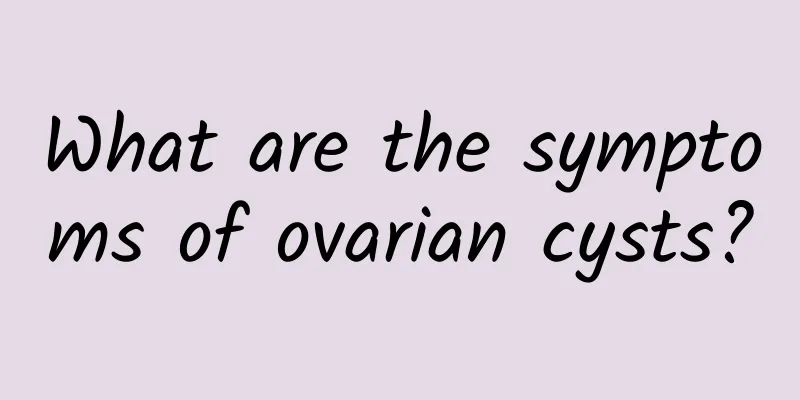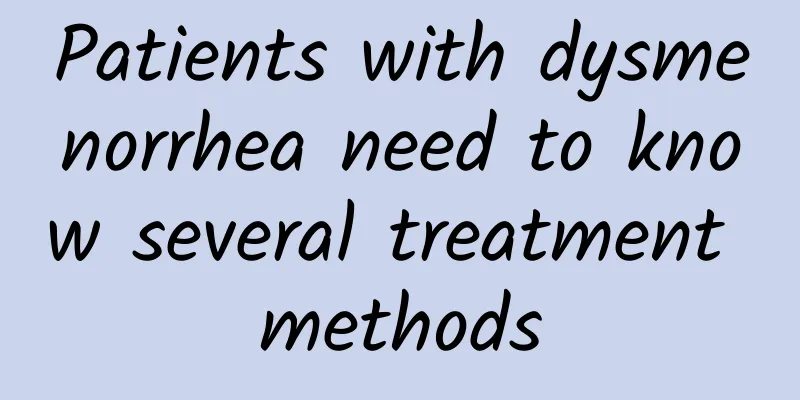What are the symptoms of ovarian cysts?

|
Ovarian cysts usually have no obvious symptoms in the early stages, and many women discover them during routine gynecological examinations. However, knowing the symptoms it may cause can help with early identification and treatment. 1. Abdominal mass and enlarged abdomen: Some women may accidentally feel a mass in the lower abdomen when they wake up in the morning. This mass may be caused by an enlarged cyst. Although it is not common to feel a mass, it is recommended to see a doctor as soon as possible once it is found. 2. Bloating and digestive problems: Ovarian cysts may cause bloating, which feels like a full abdomen after a large meal. This feeling is sometimes accompanied by frequent urination or constipation because the cyst may press on the bladder or rectum, affecting normal urination and defecation. 3. Menstrual disorders: Certain types of ovarian cysts secrete hormones that affect the menstrual cycle. Menstrual irregularities, increased or decreased menstrual flow, or even amenorrhea may occur. If menstruation is abnormal, especially when accompanied by other symptoms, it is recommended to consult a doctor in time. 4. Lower abdominal pain: Although not everyone will feel pain, some people may feel persistent or intermittent pain in the lower abdomen. This pain may sometimes be unrelated to the menstrual cycle and may even worsen after exercise or sexual activity. 5. Infertility symptoms: In some cases, ovarian cysts may affect fertility. This is usually related to the type and size of the cyst. If you have experienced difficulty getting pregnant and are accompanied by other symptoms, a detailed gynecological examination is recommended. 6. Systemic symptoms: Although uncommon, some women may feel tired or weak. This may be related to the hormone secretion of the cyst, or it may be because the presence of the cyst puts an extra burden on the body. To avoid potential health problems caused by ovarian cysts, it is important to have regular gynecological checkups. Even if you don't have obvious symptoms, don't ignore the need for regular checkups. In addition, maintaining a healthy lifestyle, eating a balanced diet and getting enough exercise can also help with overall health and prevent gynecological problems. If any of the above symptoms occur, seeing a doctor as soon as possible can help detect and treat the problem in time. By communicating with your doctor and developing an appropriate treatment plan, you can effectively manage the impact of ovarian cysts. |
<<: Can I use my phone after having an abortion?
>>: Why haven't I had my period yet after 30 days of abortion?
Recommend
Will laser treatment of cervicitis affect fertility?
Will laser treatment of cervicitis affect fertili...
What are the treatments for ectopic pregnancy?
The treatments for ectopic pregnancy mainly inclu...
Nutritional weight loss is the best way! There is a secret to not gaining weight again
The biggest enemy of people who eat out is obesit...
What are the symptoms of uterine fibroids? What are the dangers of uterine fibroids?
Uterine fibroids are a very common disease in our...
The butt is tighter! 3 Dynamic bridge exercise core muscles
Beautiful breasts are easy to see, but a nice but...
Does ovarian cyst affect fertility?
The ovaries are an important part of the female r...
Three aspects to pay attention to in preventing vaginitis
Paying more attention to personal hygiene in dail...
The causes of pelvic inflammatory disease and back pain and how to treat it effectively
Why does pelvic inflammatory disease cause recurr...
What are the rules for preventing cervical hypertrophy?
With the development of the times, more and more ...
What are the causes of ectopic pregnancy?
What are the causes of ectopic pregnancy? Ectopic...
Is it safe to have sex with a condom 18 days after an abortion?
Abortion refers to artificial abortion. It is gen...
What are the health care measures for uterine effusion?
Uterine effusion is not a common gynecological in...
What are the symptoms of uterine fibroids? Is increased vaginal discharge a manifestation of uterine fibroids?
There are also many symptoms of uterine fibroids....
What causes ovarian cysts?
What are the causes of ovarian cysts? People who ...
Medication issues for patients with candidal vaginitis
How should patients with candidal vaginitis take ...









